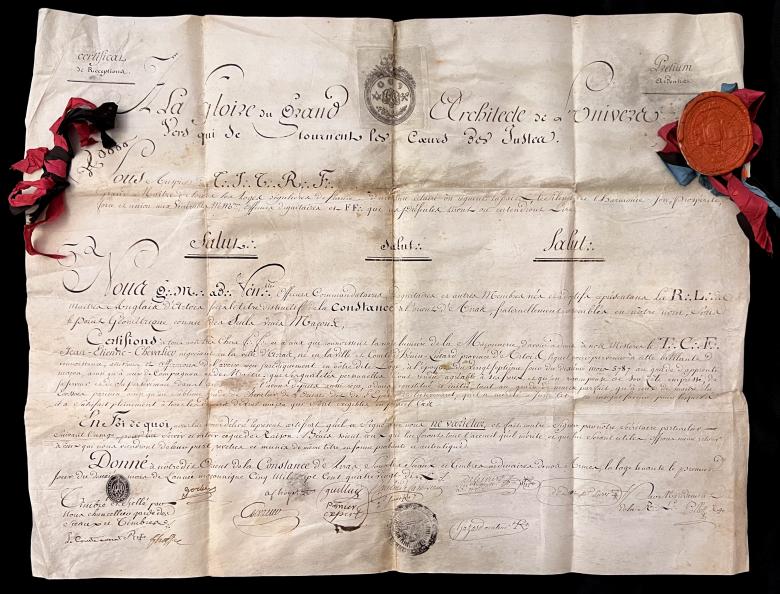Masonic diploma from La Constance Lodge of Arras


Some of our latest news
Masonic diploma from La Constance Lodge of Arras
This week's object is a Masonic diploma from La Constance Lodge of Arras, France, dating to the year 1788. The document was issued to businessman Jean-Etienne Chevalier upon his initiation in the Master’s degree.
La Constance became the very first Masonic lodge founded in Arras. Its appearance dates back to about 1745, but the lodge itself claimed an earlier origin (even earlier than the Grand Lodge of England, established in London in 1717). The mythological year of the creation of La Constance lodge in Arras was thought to be 1687.
It is most likely related to the Jacobite period in England. It was in this year that the "Declaration of Religious Tolerance" was signed by King James II of England with the intention of bringing equal the rights to Catholics and Protestants.
The connection between French Freemasonry and the Jacobites was obvious. The very first Masonic lodge in France was established in 1725 by Chevalier Ramsay, the tutor of the Jacobite claimant to the English throne "Bonnie Prince" Stuart.
In this connection it is important to note the mention of the status of English Master in the diploma, which also confirms the connection of this lodge within the Jacobite movement.
It was in Arras in 1747 that the "Bonnie Prince" Charles Edward Stuart created the Scottish Jacobite "Sovereign Initial Chapter of the Rose and Cross".
In this document the young pretender states his Masonic titles in the following words:
"We, Charles Edward, King of England, France, Scotland and Ireland, and as such Deputy Grand Master of the Chapter of Heredom, known by the title of Knight of the Eagle and Pelican, and since our sorrows and tribulations under The Name of the Rose and Cross," etc.
In this regard the Catholic orders were close to French Freemasonry, in particular, the Jesuits. Interestingly, it was the Freemasons of the city of Arras, who actively defended the Jesuits during the persecution of the order in 1762. Jacobite Freemasonry in France hoped to influence the anti-Catholic politics of England through their orders. In particular, in this regard, a number of higher degrees appear in Freemasonry, to which only Christians could be initiated.
 Museum
Museum